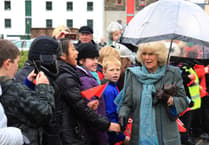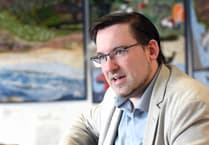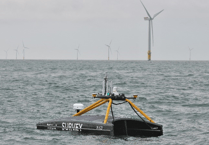Tributes have been paid to a former BBC journalist who has died aged 92.
Harold Briley cut his journalistic teeth on the Isle of Man Times, where he started working in 1948.
The (London) Times this week published his obitutuary.
Born in 1931, Mr Briley spent his first years in Anfield, Liverpool.
In 1939, he was evacuated to rural Wales, before returning to Liverpool for two years.
But he then experienced the heavy bombing of Liverpool, once being blown out of bed and across the room by a German parachute bomb.
So in 1941 he was evacuated again, this time to the Isle of Man.
In 1942, he won a scholarship to Douglas High School. He worked before school on a horse-drawn milk delivery cart and after school cleaned offices to help the kind people with whom he was living.
From 1948 to 1953 Mr Briley was an apprentice reporter on the Isle of Man Times, and a verbatim shorthand reporter in Tynwald.
He did his National Service in the Royal Artillery, as a surveyor and forward observer on the Hong Kong border facing the Chinese communist army, before returning to the Isle of Man.
In 1954, he became a reporter on the Manchester City News. Then from 1954 to 1960, he worked for the Liverpool Post and Echo, reporting on crime, shipping and politics.
In 1960, Mr Briley began a 30-year long career with the BBC. He worked first as a news editor, political correspondent, and a foreign, war and defence Correspondent, filing hundreds of reports from about 70 countries.
As a lobby correspondent, he wrote the BBC’s Today in Parliament and national news bulletins for six years. He was the first-ever political correspondent for BBC World Service.
In 1971, he was assigned to India and Pakistan where he covered the Bangladesh War.
In 1973, he became the BBC United Nations correspondent in New York. In 1977, he became the BBC East Europe correspondent. and in 1979, he covered the Iranian Revolution, which at times put him in serious personal danger.
From 1979 to 1983, Mr Briley was the BBC’s Latin America correspondent, which took him initially to cover the Nicaragua Sandinista Revolution.
He was based in Buenos Aires. From there he covered Argentina, reporting for three years on the Argentine military dictatorship’s atrocities against those who opposed it.
This resulted in many threats from Argentine government thugs. He also covered the repression in Chile under the Pinochet regime.
Mr Briley’s posting to Latin America had also allowed him to visit the Falklands for the first time, which he did in 1981.
He landed then in the Bay of San Carlos where British forces landed 15 months later to liberate the Falklands.
In April 1982, he was the first to break the news internationally of the Argentine invasion.
He then covered the entire war.
Mr Briley had to send his family to safety in Rio de Janeiro, because of the war.
After the war, he interviewed, or met, many of the leading military and political figures on both sides including Margaret Thatcher, whom he accompanied to the Falklands, and Governor Rex Hunt.
He also interviewed General Menendez (Malvinas Military Governor), and Admiral Lombardo, who had updated an earlier Argentine invasion plan.
Harold returned to Britain in 1983. Amongst other tasks, he became defence correspondent for the BBC until his retirement in 1990, when he settled in the town of Battle, in Sussex.
He became an honorary life member of the National Union of Journalists. He was awarded the OBE for services to journalism and broadcasting.
In 2022, just a year before his death, Harold published his book the Fight for Falklands Freedom, which covered the 1982 war, and the attempts by the Foreign Office to sell Falkland Islanders out in shady deals with Argentina in the years leading up to the Falklands War.
In 2022, the Falklands Government honoured Mr Briley by naming a recreational park after him on top of Sapper Hill which overlooks Stanley.
Mr Briley is survived by his wife Norah whom he met in the Isle of Man. They have two children Heather and Kevin.
Harold Rowlands, the most senior Government official during the Falklands 1982 occupation, said: ‘Throughout the period of the Falklands crisis, there was continuous praise here for the BBC services. The BBC was the only reliable news media to inform us what was taking place in the islands and the South Atlantic.
‘Reception was good and we wish to thank producers, announcers, technicians, and other contributors for their magnificent coverage. A special word of thanks to Harold Briley for keeping us informed of events in Argentina.urer, Falkland Islands Government.
Sir Rex Hunt, Falkland Islands Governor in 1982 invasion, said in his autobiography: ‘Harold Briley in Argentina and Sir Anthony Parsons (British Ambassador) at the UN were the two most comforting and reassuring voices to the Falklands in the 1982 crisis.
‘After the conflict, the Falkland Islands expressed their appreciation with a huge banner outside Government House saying “God bless you Harold”.’
Lord Carrington, former Defence and Foreign Secretary and NATO Secretary General, wrote about Mr Briley before he died in 2018.
He said: ‘I had a long association with Harold Briley over many years in every corner of the world. In all his dealings with me he has been one of the best correspondents I have ever met and the most scrupulously honest and most considerate, assiduous, well-informed, objective and efficient. In good times and bad, we never had a bad word.’
Sir John Tusa, former managing director of the BBC World Service, said: ‘Harold Briley’s Falklands coverage was one of the most extended pieces of sustained stamina of any correspondent on any story. His determination to find out and get to the story has been extraordinary and admirable.’
The Isle of Man Times folded in 1986.




